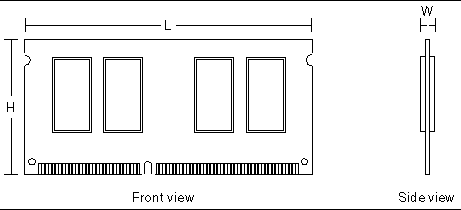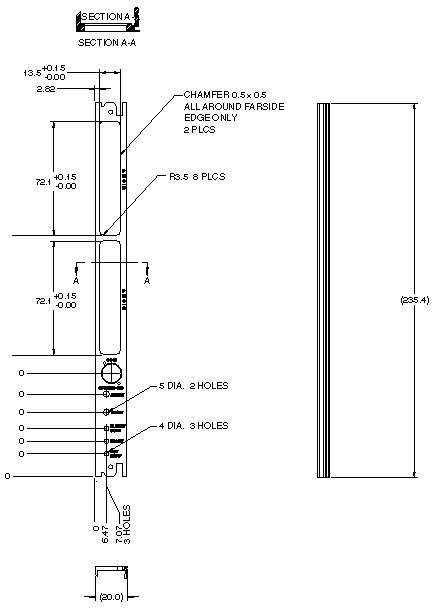| Netra CP2300 cPSB Board Installation and Technical Reference Manual
|
   
|
Specifications for the Netra CP2300 board are provided in the following sections:
- Section A.1, System Compatibility Specifications
- Section A.2, CPU Specifications
- Section A.3, Main Memory Specifications
- Section A.4, Memory Configuration Specifications
- Section A.5, PMC Interface Specifications
- Section A.6, Power Requirements
- Section A.7, Mechanical Specifications
- Section A.8, Environmental Specifications
- Section A.9, Thermal Validation
- Section A.10, Reliability/Availability Specifications
- Section A.11, Compliance Specifications
A.1 System Compatibility Specifications
TABLE A-1 System Compatibility Attributes
|
Property
|
Specification
|
|
H110 chassis compatible
|
CompactPCI J4 is unconnected at the board; which enables this board to be used in H110 chassis
|
|
NEBS compliance
|
NEBS Level 3 specification compliance
|
|
CompactPCI compliance
|
- PICMG 2.16 CompactPCI Packet Switched Backplane specification
- PICMG 2.1 R1.0 Hot Swap specification
- PICMG 2.9 System Management specification
|
A.1.1 CompactPCI Specification Notes
PICMG 2.0 Rev 3 and IEEE 1101.10-1996 requires 2.54mm between the top of components and the separation plane, and there is at least approximately 0.5mm to 2mm of clearance to solder-side components or leads of an adjacent board from that same separation plane. Therefore, there is very little chance that a small specification violation will impact an adjacent card in a PICMG 2.0 Rev 3 compliant chassis.
Care should be taken when installing the boards in systems that have extreme solder-side component heights or in system chassis that do not allow clearances specified in the PICMG or IEEE standards.
The Netra CP2300 board also has a solder side cover installed. The components on the solder side cover meet the limits of the cPCI specification for maximum height. The solder side cover is nominally 1mm thick. When this cover rests upon components greater than 1mm in height, the cover itself may violate the cPCI specification where it rests on these components.
A.2 CPU Specifications
TABLE A-1 CPU Specification
|
Property
|
Specification
|
|
CPU
|
650 MHz UltraSPARC IIi
|
|
Mounting
|
370-pin ceramic PGA package soldered to board
|
|
Architecture
|
Sun 4U; 64-bit SPARC V9 architecture with the VIS instruction set
|
|
Cache
|
Integrated, 512 Kbyte, 4-way, set-associative internal L2 cache operating in 2:2 mode
|
|
PCI bus local interface
|
PCI Bus 2.1 compatible, 33/66 MHz, 32-bit, 3.3V (internal to board only)
|
A.3 Main Memory Specifications
TABLE A-2 Memory Specification
|
Property
|
Specification
|
|
Memory size--min
|
512 MB on-board memory
|
|
Memory size--max.
|
1.5 GB (512 MB on-board memory plus two 512 MB SO-DIMM memory modules)
|
|
Onboard memory
|
512 MB on-board memory
|
|
Memory type
|
3.3V, synchronous DRAM with ECC LVTTL-compatible CMOS; configured on bus width of 64-bit + 8-ECC bits
|
|
Identification to system
|
Serial EEPROM provides serial presence detect (SPD)
|
|
CAS latency
|
CAS Latency 2 (CL2)
|
|
SDRAM characteristics
|
PC133-Compliant, unregistered and unbuffered
|
|
ECC
|
8-bit; single bit error correction; double-bit error detection
|
A.4 Memory Configuration Specifications
The Netra CP2300 board contains 512 MBytes of on-board SDRAM memory. The board also contains two connectors for PC133 ECC SO-DIMM memory expansion (see Section 2.4.1, Installing SO-DIMM Memory Modules for installation instructions).
The Netra CP2300 board supports SO-DIMM memory modules that match the following characteristics:
- 144-pin ECC SO-DIMMs that conform to the JEDEC 21-C standard
- Memory data bus width: 64 bit data, 8 bit ECC
- PC133-compliant SDRAM
- CAS Latency 2 (CL2)
- Serial presence detect (SPD) support required
- Unregistered and Unbuffered
The low profile memory connectors of the CP2300-650-512MBLP configuration
will accept SO-DIMM memory modules, with heights 31.75 mm (1.25 in.) or
less, that meet the JEDEC 21-C standard. The larger memory connectors of the CP2300-650-512MB configuration will accept SO-DIMM memory modules that exceed the standard's width dimension by 1.2 mm (.04 in.).
FIGURE A-1 and TABLE A-3 show the allowable mechanical dimensions of SO-DIMM memory modules for each board configuration.
FIGURE A-1 SO-DIMM Memory Module Dimensions

TABLE A-3 Allowable SO-DIMM Physical Dimensions
|
Board Configuration
|
Connector Type
|
Physical Dimensions of Allowable SO-DIMM Modules
|
|
CP2300-650-512MBLP
|
Low profile
|
31.75 mm (1.25 in.) H x 67.60 mm (2.66 in.) L x 4.00 mm (.15 in.) W
|
|
CP2300-650-512MB
|
Regular
|
31.75 mm (1.25 in.) H x 67.60 mm (2.66 in.) L x 5.20 mm (.20 in.) W
|
TABLE A-4 lists the SO-DIMM memory size and configurations.
TABLE A-4 SO-DIMM Memory Configurations
|
SO-DIMM Memory Size
|
Configuration
|
SDRAM Device Size
|
Number of Chips on Each SO-DIMM
|
Memory Size of Two SO-DIMMs
|
Total Memory Capacity (Including 512 MB
On-Board Memory)
|
|
64 MB
|
8M x 72
|
64 Mbit
|
9
|
128 MB
|
640 MB
|
|
128 MB
|
2 x 8M x 72
|
64 Mbit
|
18
|
256 MB
|
768 MB
|
|
128 MB
|
16M x 72
|
128 Mbit
|
9
|
256 MB
|
768 MB
|
|
256 MB
|
2 x 16M x 72
|
128 Mbit
|
18
|
512 MB
|
1024 MB (1 GB)
|
|
512 MB
|
2 x 32M x 72
|
256 Mbit
|
18
|
1 GB
|
1536 MB (1.5 GB)
|
|
1 GB
|
2 x 64M x 72
|
512 Mbit
|
18
|
2 GB
|
2560 MB (2.5 GB)
|
A.5 PMC Interface Specifications
TABLE A-5 PMC Interface Specification
|
Property
|
Specification
|
|
PMC module interfaces on system board
|
Two interfaces at PMC A and PMC B
|
|
Interface IEEE P1386.1 compliance
|
With draft 2.1
|
|
Connector configuration, PMC A (P1386 designations)
|
Jn1 (J5), Jn2 (J7) carry PCI signals; Jn4 (J7) module I/O is connected to the CompactPCI J3 (J13) backplane connector
|
|
Connector configuration, PMC B (P1386 designations)
|
Jn1 (J6), Jn2 (J12) carry PCI signals; Jn4 (J11) module I/O is connected to the CompactPCI J5 (J14) backplane connector
|
|
PCI clock
|
33 MHz
|
|
PCI bus width
|
32-bit
|
|
Max power load -- per module, combined power rails (5V, 3.3V,
12V, -12V)
|
7.5 W
|
A.5.1 PMC Specification Notes
The regular SO-DIMM memory connectors on the CP2300-650-512MB configuration may interfere with PMC cards installed in PMC slot A, as these tall connectors do not meet the PMC clearance specification (they are 0.5 mm out of clearance).
When at all possible, install PMC cards that exceed PMC component height restrictions in the PMC A slot. PMC disk drive cards in particular may impact the memory connectors on PMC A, as some commercially available PMC disk cards exceed component height and/or thermal restrictions.
The low profile SO-DIMM memory connectors on the CP2300-650-512MBLP board configuration meet the PMC clearance specification.
A.6 Power Requirements
This section provides information on power sequencing and power requirements by connection phase. TABLE A-6 shows the power drawn from the backplane connector by phase.
TABLE A-6 Netra CP2300 Backplane Connector Power Requirements by Connection Phase
|
Power Rail
|
No BP Power
|
Early power on long pins
Typical (A)
|
Main power on medium pins:
Typical
(with 512MB on-board total memory)
|
Main power on medium pins:
Typical
(with two 512MB SO-DIMMs installed)
|
Description
|
|
+5V
|
0
|
0.35
|
3.0A average (3.5A peaks)
|
3.0A average (3.5A peaks)
|
At CompactPCI connectors J1(J9)/J2(J10)
|
|
+3.3V
|
0
|
0.02
|
1.5A average (2.2A peaks)
|
3.4A average (3.3A peaks)
|
At CompactPCI connectors J1(J9)/J2(J10)
|
|
+12V
|
0
|
0.00
|
15mA
|
15mA
|
At CompactPCI connectors J1(J9)/J2(J10)
|
|
-12V
|
0
|
0.00
|
15mA
|
15mA
|
At CompactPCI connectors J1(J9)/J2(J10)
|
|
IPMB_PWR
|
0.15
|
0
|
0
|
0
|
At CompactPCI connector J1(J9)/A4
|
A.7 Mechanical Specifications
The Netra CP2300 board's front panel meets the mechanical specifications found in the CompactPCI specification PICMG 2.0 R3.0. See Appendix D for a reference to this specification. FIGURE A-2 shows a mechanical illustration of the Netra CP2300 board panel.
FIGURE A-2 Mechanical Illustration of the Netra CP2300 Front Panel

A.8 Environmental Specifications
TABLE A-7 Environmental Conditions and Limits
|
Ambient Conditions
|
Low Limit
|
High Limit
|
|
Transportation and Storage Temperature
|
-400 C
|
+700 C
|
|
Transportation and Storage Humidity
|
5% RH
non-condensing
|
95% RH
non-condensing
|
|
Operating Temperature
|
00 C (-50 C short term)
|
400 C (550 C short term)
|
|
Operating Humidity
|
15% RH
non-condensing
|
85% RH (90% RH short term)
non-condensing
|
|
Shock and Vibration
|
As stated in NEBS GR-63 CORE specifications, section 4.3.1 and 4.3.2 for shock criteria and 4.4.3 for vibration criteria;
MIL-STD 810E, Method 514.4, CAT I
MIL-STD 810E, Method 516.4, II-3.2
|
|
Electrostatic Discharge
|
NEBS GR-1089 Section 2
|
A.9 Thermal Validation
The CPU diode temperature should not exceed 850 C when installed in the system. Refer to the Netra CP2300 cPSB Board Programming Guide (816-1331-xx) for more information on thermal validation.
A.10 Reliability/Availability Specifications
Reliability, availability and serviceability (RAS) specifications for the Netra CP2300 cPSB board are available through the Sun Sales office under a non-disclosure agreement.
A.11 Compliance SpecificationsA.11.1 Agency Compliance
All printed wiring boards (PWBs) are manufactured by UL recognized manufacturers, and have a flammability rating of 94-V0 or better.
Compliance with EMI and safety regulations for products including the Netra CP2300 board is entirely the responsibility of OEMs. The Netra CP2300 board has passed FCC Class A tests in representative enclosures. However, the EMI Class of the end use system is dependent upon system level EMI design parameters.
The Netra CP2300 boards are intended to be incorporated into systems meeting the following regulations and compliances:
- USA FCC part 15
- USA Safety UL 60950
- Canadian EMI ICES-003
- Canadian Safety CSA C22.2 Number 60950
- European Union EMC CE Mark EN55022, EN555024 and EN300-386 v1.3.1
- European Union Low Voltage Directive Safety CE Mark EN 60950
- Japanese EMI VCCI
- Taiwanese EMI BSMI
- Korean EMI MIC
A.11.2 NEBS Level 3
Board requirements for NEBS Level 3 criteria provide the highest assurance of product operability with minimal service interruptions over the life of the equipment. The requirements include the following categories and all associated sections and subcategories:
- GR-63-CORE, Issue 1, October 1995 - Network Equipment-Building System Requirements: Physical Protection
- GR-1089-CORE, Issue 2, Revision 1, February 1999 - Electromagnetic Compatibility and Electrical Safety - Generic Criteria for Network Telecommunications Equipment

